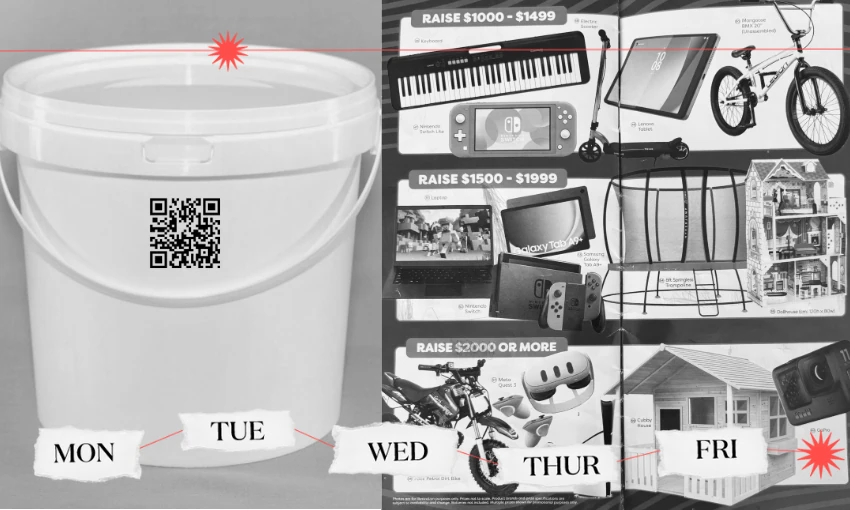By Madeleine Chapman
Copyright thespinoff

Madeleine Chapman reflects on the week that was.
When I was about 10 years old I read the Dominion Post front-to-back (excluding the business section) every day. Which means I knew immediately when a new promotion started that involved finding “money” printed in the paper every morning and collecting the notes of different denominations. It was a competition, and at the end of it, you could bid online for prizes. The prizes ranged from small things like biscuits all the way up to cellphones and computers.
My brother and I were hyper competitive so we set our sights on buying a computer. As children, we had no concept of “networking” and still believed wholly in an individual meritocracy, so we hatched a genius plan to acquire more money notes than anyone else receiving a single newspaper each morning, and certainly more than any other kid was willing to work for (we soon learned no other primary-aged kids were reading the paper every morning so no one at school had any idea what we were up to).
Every Wednesday for what must have been a month, we ran out of the house in different directions at 7.40am. It had to be 7.40 because that was late enough for all our neighbours to have put out their recycling bins but before the truck came at 7.55. At each bin we would rifle through the stacks of newspapers and rip out their unused coupons. We had the pages memorised (Monday A12, Tuesday A18, Wednesday C7 etc) and could get through a full bin of papers in 30 seconds, running away with the coupons stuffed in our pockets. After the first week we knew, bitterly, which neighbours were also playing and had already cut theirs out. We never thought to just ask our other lovely neighbours to cut them out for us before throwing their papers away.
By the end of the promotion, we had every possible coupon a dozen times over and we felt positively rich. I don’t remember the amount but let’s say we had collected $50,000 in bidding money thanks to our early morning efforts. We were ready to buy a computer. We browsed through the many prizes you could bid on. The big tech items and sports gear and the many, many listings for the cheaper prizes. We made a list of items we could bid on, believing we could probably get more than one prize with our haul.
On the day of the auctions, we clicked on our beloved prizes and gasped. With hours still to go in the bidding, the top bids were in the hundreds of thousands, some even in the millions. How? How many recycling bins were these other people rifling through? There in the bidding history was not a list of other kids’ names, or even adults’ names. They were names of schools we’d never heard of, community groups and businesses. We thought we had done so well against other individuals and suddenly realised we were up against entire armies.
I remember us just sitting there for a moment in disbelief, before quietly scrolling way down to the smallest auctions. At 3pm when bidding closed, we’d spent every last dollar we’d collected and had bought a single packet of Tim Tams.
This week, Michelle Duff wrote about Jumping June, the skipping challenge that encourages kids to raise money for the New Zealand Heart Foundation in exchange for prizes. It’s a very similar concept to the promotion my brother and I were obsessed with, and it sounds like kids today are equally obsessed with getting the best prizes. Except that for Jumping June, it’s a charitable exercise run by a for-profit company that requires kids to wrangle money from their loved ones in order to participate. The inequities are obvious and yet it’s a charity drive also targets schools in the lowest deciles.
Five years after that promotion ran, I transferred from a state school to a private school. I’d participated in bake sales and raffles and the like at my former school, usually fundraising a few hundred dollars at a time for our chosen charity. Three months after starting at a private school, a new friend and I decided to do Shave for a Cure. We raised $12,000 just from asking our classmates to ask their parents for donations.
Sometimes you work really hard to scrape together enough for a packet of biscuits on your own. And sometimes you just ask the right people and get a thousand times more.
Two days ago I asked my brother (who’s two years older than me) if he remembered the promotion and who ran it…
Does anyone else remember this promotion or am I going crazy? If you do, I would love to hear from you to fill in my memory gaps. Who ran it??? What was it for??? Please comment below or get in touch at madeleine@thespinoff.co.nz.
The stories Spinoff readers spent the most time with this week
A beautiful cover story from Liam Rātana about Māori men at the turning point
Michelle Duff on Tom Phillips and the mythologising of the ‘good Kiwi bloke’
Hayden Donnell reports from the campaign trail as Woke Wayne [Brown] takes on the grey masses
Four departing mayors tell Hayden Donnell what they really think
Hayden Donnell again, live-blogging the meeting where Auckland Council voted to allow for houses to be built
Feedback of the week
On Hawaiki hou: Māori men at the turning point
“Sobering statistics throughout this kōrero – mana motuhake is our future. Kia ora for sharing Liam – I appreciate your honesty. I can’t quite believe you hadn’t heard ‘Cat’s in the Cradle’ before – that was what shocked me the most 😉 Ngā manaakitanga – Kim”
On Is this skipping challenge a wholesome kids’ fundraiser or a slick money-spinner?
“The first year this was done at my kid’s school my husband and I fundraised and got a pretty good amount in, but it still left a bad taste in our mouths. Our kid goes to a low decile school and there were lots of kids who missed out on prizes. My husband raised this with the school and never received a reply about it.
This year we didn’t do any fundraising for them, and we explained why to our kid. The fundamentally unfair nature of the fundraising, and the weird tactics they were using to get kids to fundraise. I had no problem with her doing the skipping. Skipping is great! But not for pulling in profit like this. ”
On Help Me Hera: My partner and I can’t have kids
“This was such a helpful read. My feelings about having children generally ranged between ambivalence and reluctance, but I ended up having a kid in my mid 30s. I usually avoid talking about my son with my friends who haven’t got kids. If they ask, I sometimes find myself belittling the parenting thing, as perhaps I’ve thought that was a way to bridge the gap between our different choices (if it was their choice) or to mitigate the chance of my experience causing them grief (if it wasn’t their choice). But I see now that this is more about my own discomfort. I hadn’t thought about how obnoxious it could come across to so easily change my mind, have a kid, and then be flippant about it. I’ll have a good rethink about this one.”



